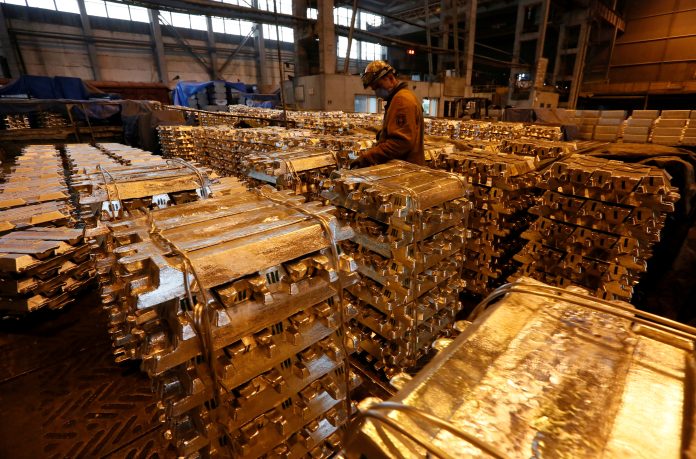The EU may include an embargo on Russian aluminium imports in the thirteenth package of sanctions, which would cause a jump in metal prices and protests from the industry association, IntelliNews reports.
Discussions have already begun on the next package of sanctions, which the EU would like to issue by mid-February.
Aluminium prices rose more than 3% on 23 January on this news and led the gains among base metals after reports of the possibility of a new package of EU sanctions on Russian aluminium. ING said in a note:
“There are speculations of a potential complete ban on aluminium imports in the upcoming Russian sanctions package scheduled to be released next month. Russian metals had broadly escaped sanctions until last month, when the UK prohibited British individuals and entities from trading physical Russian metals, including aluminium, nickel and copper. UK is the only country in Europe to have adopted such measures.”
The ban will trigger a price hike. When the Office of Foreign Assets Control (OFAC) banned Western countries from doing any business with oligarch Oleg Deripaska, owner of RusAl, Russia’s largest aluminium producer, in 2018, the price of the metal on the London Metal Exchange (LME) jumped 40% in just one night. This prompted OFAC to delay the sanctions and eventually lift them when it was noted that the ban would add about 15 cents to the cost of a can of Coke in the US.
According to ING, the proposed ban could lead to the LME once again debating whether it should ban Russian metal supplies. At the end of December, just over 90% of aluminium on the LME was of Russian origin.
In December, the EU adopted a twelfth package of sanctions, which included a ban on trade in Russian diamonds. New restrictions were also imposed on imports of goods such as aluminium wire. The main focus of the latest sanctions packages has been to improve the effectiveness of the existing eleven rounds of sanctions rather than to impose new bans on goods and services. A key component of the new package could be energy-intensive aluminium imports, which have been 85% unaffected by the current sanctions regime.
One diplomat told Politico that the aluminium sanctions indirectly target Russia’s energy sector, which accounts for 40% of the costs of smelting aluminium.
New sanctions could affect nuclear technology and fuels, as well as imports of liquefied natural gas (LNG), but the EU is still heavily reliant on them at the moment, so both have been put on hold.
According to a senior EU diplomat, attention has now shifted to less obvious areas such as aluminium, as significant sectors have already been affected by the sanctions.
Nevertheless, carrying out these proposals will not be easy. Central European countries such as Hungary are resisting sanctions on Russian nuclear fuel and technology because of ongoing projects with Russia’s Rosatom, which is building two new reactors in Hungary.
Moreover, many EU countries oppose sanctions on Russian LNG. Europe currently buys half of Russia’s gas exports, with Spain and Portugal seeing a sharp increase in Russian LNG imports over the past year. Poland, Estonia, Latvia and Lithuania are in favour of a ban on LNG and aluminium imports, as well as further sanctions in the aviation sector.
Harbor aluminium, a consultant to the sector, said the expansion of the ban imposed in December on wire rod, extruded products and foil would have serious economic implications. The new bans could include additional aluminium semi-finished products and some or all primary aluminium products. Harbor said:
“The ban would inflict material damage to the European aluminium supply chain, given its irreplaceable need for Russian aluminium products (especially slab and PFA) at a time when European primary aluminium production has declined by 1mn tonnes since 2021, while Middle Eastern and Indian primary aluminium units are being impacted by the Middle East conflict and Red Sea disruption.”
The ban would also significantly reduce the carbon footprint of aluminium in Europe because EU consumers would have to import more aluminium from non-environmental countries to replace the loss of low-carbon Russian aluminium products.
In Harbor’s view, this would result in a less competitive European downstream industry (through higher European premiums) and, therefore, a relative strengthening of competing players in markets elsewhere, such as Turkey, Southeast Asia, India and Latin America (through lower premiums resulting from increased supply of Russian primary blocks in these markets). Harbor said:
“In our view, an EU ban on imports of Russian primary aluminium products (not our base scenario) would not reduce the world’s supply of primary aluminium (only change its flows) and thus be irrelevant to LME prices beyond short-term volatility. Indeed, EU restrictions would redirect metal units from Europe to the rest of the world—i.e., Turkey, India, China, South East Asia, Africa, and Latin America. We don’t expect the LME to ban Russian aluminium from the exchange (even if the ban were to include all Russian primary aluminium) as we see the LME continuing to serve its function as a market of last resort for the world’s primary aluminium market. Russian aluminium would still be traded in all regions of the world except for Western Europe and the US.”
